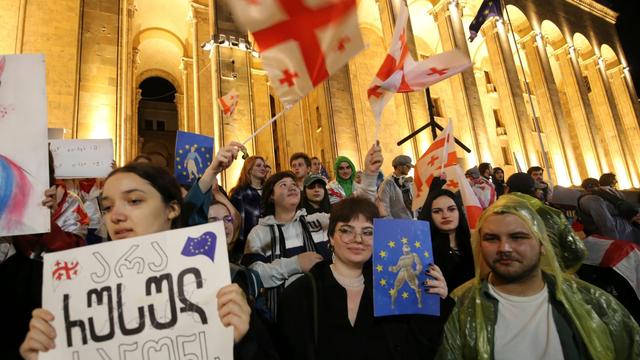In the little republic Georgia In the South Caucasus, the power struggle between the government and a strong protest movement is coming to a head. The demonstrations, which have been going on for weeks, are the result of a law that critics fear will be used to harass civil society, as in Russia. But at its core it is about the democratic development of the former Soviet republic on Russia’s southern border; It is about the course of the EU accession candidate towards the EU and NATO.
The demonstrations continued to increase over the weekend. Tens of thousands of people gathered in the center of the capital Tbilisi. The third reading of the law begins today in Parliament’s Justice Committee. The plenary vote will take place on Tuesday. Tbilisi University students have announced new protests: “We will oppose the attempt to legalize Putin’s dictatorship by law.” Questions and answers about the situation:
What is the controversial law about?
According to the Georgian Dream party, which has been in power since 2012, foreign countries have too much influence in Georgia through the support of non-governmental organizations. There is a “lack of transparency,” says MP Maka Bochorishvili from the government camp. The new law tightens the responsibility for this NGOswho receive more than 20 percent of the money from abroad.
Hardly any other country has received as much aid for projects in the field of democracy promotion, the media, social affairs, the environment and the economy as Georgia. Of the more than 20,000 registered NGOs, 4,500 to 5,000 are actually active, estimates Stephan Malerius, representative of the CDU-affiliated Konrad Adenauer Foundation in Tbilisi. “I believe that the investments of the EU, the US and other donors in civil society have been very wise,” said the head of the South Caucasus South Caucasus regional political dialogue program.
Critics of the law fear the organizations will be cut off from foreign money and silenced. In Russia critical NGOs are branded as ‘foreign agents’; That’s why protesters in Georgia only call the draft the “Russian law.”
What do Georgian Dream and billionaire Ivanishvili want?
The paradox is that the Georgian Dream government led the successful talks on EU candidate status. According to her words, she will stick to the EU’s course, but at the same time strive for good contacts with Moscow.
The party’s strongman is founder Bidzina Ivanishvili (68), who became a billionaire with business in Russia and was also prime minister for a time. At the end of April, he gave a speech in Tbilisi announcing an authoritarian turn – somewhere between Viktor Orbán in Hungary and Vladimir Putin in Russia. He threatened the opposition with criminal charges after the arrival General election in October. Georgia must protect itself against corrupting Western influences. And he spoke of a “global war party” pushing Georgia and Ukraine to confront Russia.
Does Russia really have a hand in this?
In contrast to international criticism, Russia defended the law. “No sovereign state wants other countries to interfere in its domestic politics,” Kremlin spokesman Dmitry Peskov said. It is absurd to see the law as a “Russian project”.
Observers like Malerius see similarities with developments in Russia beyond NGO legislation. A new law will ease the flow of offshore money into Georgia, which could help Ivanishvili and the Russians avoid sanctions. Such evidence shows that “the script for this event was written in Russia,” says Malerius.
Who is responsible for the protests?
Young people in particular are taking to the streets. Many have visited the EU without a visa and see their country’s European prospects at risk. There are no clear leadership figures. But President Salome Zurabishvili is on the side of the protest. There are also trade unionists, prominent athletes and artists, some clergy of the Orthodox Church and individual representatives of the Georgian Dream. In recent days, the state has publicly denounced government opponents and incited criminals to attack them. This fueled the demonstrations.
What consequences can the conflict have?
The EU calls the law an obstacle to Georgia’s accession. “Georgia is at a crossroads. It must continue its course towards Europe,” Commission President Ursula von der Leyen said recently. Your candidate status may not be immediately revoked. But sanctions could follow against Ivanishvili and the people around him. Among the US leadership, National Security Advisor Jake Sullivan was deeply concerned about “democratic regression.”
Ivanishvili and Iraqi Prime Minister Kobakhidze are confident that they can weather the wave of protests. But given the dynamics of the protests, it does not seem impossible that the government will fall. Georgian Dream could also lose the October parliamentary elections, in which it was actually heading for a safe victory given the fragmented opposition.
Repealing the law for the second time after 2023 would be a bitter defeat for Georgian Dream, wrote expert Alexander Atasuntsev for Carnegiepolitika. “But not withdrawing means risking the country’s European future and at the same time your own power.”
© dpa-infocom, dpa:240513-99-09805/2
In the little republic Georgia In the South Caucasus, the power struggle between the government and a strong protest movement is coming to a head. The demonstrations, which have been going on for weeks, are the result of a law that critics fear will be used to harass civil society, as in Russia. But at its core it is about the democratic development of the former Soviet republic on Russia’s southern border; It is about the course of the EU accession candidate towards the EU and NATO.
The demonstrations continued to increase over the weekend. Tens of thousands of people gathered in the center of the capital Tbilisi. The third reading of the law begins today in Parliament’s Justice Committee. The plenary vote will take place on Tuesday. Tbilisi University students have announced new protests: “We will oppose the attempt to legalize Putin’s dictatorship by law.” Questions and answers about the situation:
